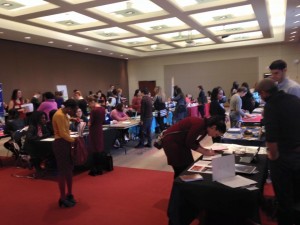The Research Park Career Fair is still ahead of us (March 15), but much of the spring career fair season is winding down. If you went to a career fair this year, well done! Career fairs are a great way to meet potential employers, explore career paths, and practice your interviewing and networking skills. If you didn’t go to one, definitely plan to take advantage of them next year! While some fairs (e.g., the Engineering Career Fair, the Urban Planning Fair) are intended for students with specific technical skills, many fairs feature recruiters seeking students from a variety of programs. Fairs are also targeted towards particular fields of relevance to department of English majors. The Design+ Job Fair, the Arts and Culture Fair in Chicago, the Educators Fair, and the Illini Career and Internship Fair are particularly oriented towards the interests and skills of people who study English and Creative Writing.
Two English majors who attended the recent Arts and Culture Career Fair in Chicago were willing to share their experiences. Meghan McCoy (a sophomore) and Henry Yeary (a freshman, who also attended the Business Career Fair last month) independently offered the same two pieces of advice based on their experience:

1. Go. Go early in your college experience. Go before you actually need to find an internship or career.
Both Henry and Meghan said that they went to last month’s career fairs mostly for the experience, as neither expected to obtain a job or internship as a result of going. They felt that the experience alone was beneficial and that as a result of attending, they’ll be better prepared for future career fairs when they actually need to find a position. It was interesting, they said, to learn more about “real world” jobs available to humanities students and was good practice for future interviews.
2. Prepare before you go.
While both students knew ahead of time that they were interested in particular positions at the career fairs, they said that in the future they’d do even more research about organizations of interest beforehand. Henry said that researching specific companies more thoroughly would allow him to better market himself for particular positions and, consequently, to stand out more. Doing substantial research ahead of time can also allow you to be more strategic about the time you spend at a career fair, Meghan observed. Keep in mind that the first couple introductions might feel a bit rough, so it’s a good idea to start out talking with a few companies you’re less interested in so that your elevator pitch feels more comfortable and more practiced when you talk with recruiters for the positions you care about most.
Henry said that both career fairs featured a number of interesting jobs—in marketing, advertising, PR, curatorial work, and other fields—that would be a great fit for English majors’ skills. He also stressed that, although the University culture places a lot of attention on one’s major, many of the positions at the career fairs could be filled by students from virtually any major. What matters most are one’s skills and experiences, so cultural stigmas about earning a degree in the humanities should have no bearing on your success at the career fair.
The English Department organizes periodic information sessions about preparing for a career fair, which can be helpful in demystifying the experience. If you can’t make it to those events, you can also meet one-on-one with the English Department’s awesome Director of Internships, Kirstin Wilcox (kwilcox@illinois.edu), to discuss what to expect going into your first career fair and to practice your elevator pitch beforehand.
